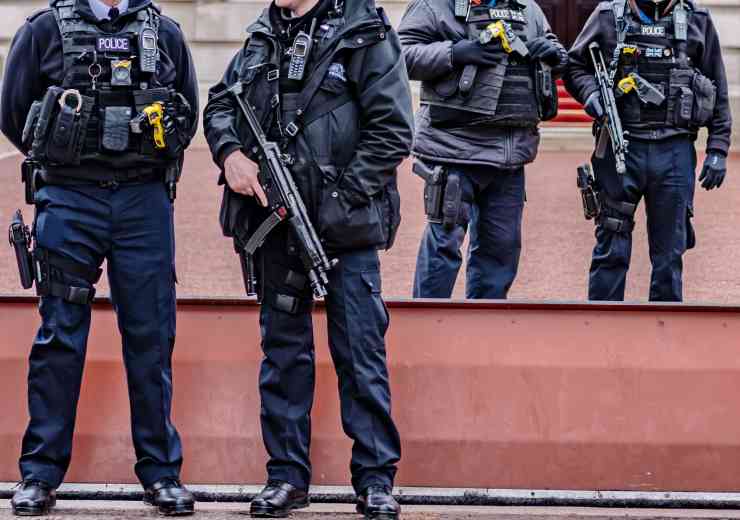
CTB's review of 2024
CTB takes a look back at some of the biggest stories this year, including Martyn’s Law, a new government and the riots
JANUARY
In January, the UK parliament declared Hizb ut-Tahirir a terrorist organisation. Belonging to or supporting this group was made a criminal offence, with a potential sentence of 14 years.
The UK and the US announced sanctions for those involved in financing Hamas and the Palestinian Islamic Jihad (PIJ).
A new law was introduced to ban the possession, sale, manufacturing, or transportation of zombie-style knives and machetes, in an initiative to protect young people and make streets safer for all. The full ban came into force in September this year.
The new Online Safety Act offences also came into full force, which included criminalising threatening messages, death threats, and encouraging others to self harm, all of which carry a sanction of up to five years in prison.
FEBRUARY
In February, the Home Office launched a standard tier consultation of Martyn’s Law, building on previous legislation and investigating how the bill would affect smaller premises. The proposals set out different requirements for standard tier premises, with a capacity of 100-799 individuals, and enhanced tier premises and public events with capacities of 800 individuals or more.
Jonathan Hall KC was also appointed independent reviewer of state threat legislation, a new role established as part of the new National Security Act 2023. He will assess and report on the fairness, effectiveness, and proportionality of UK state threats legislation.
For the first time, defence industry spending exceeded £25 billion with spending doubling in Yorkshire and the Humber, and raising by 25 per cent in Wales. 209,000 jobs have been supported by the MOD’s expenditure.
MARCH
In March, Sweden became NATO’s newest member, upping its membership to 32 countries.
The government announced “an updated, more focused” definition of ‘extremism’ “to tackle the ever-evolving threat of extremism in the UK”. This update follows the Community Security Trust recording a 147 per cent increase in antisemitic incidents in the UK in 2023 compared to 2022, and Tell MAMA recording a 335 per cent increase in Islamophobic cases in the last four months.
Latest data released by the Home Office showed that 2023 had the highest number of terrorism arrests of young people since records began on 11th September 2001, with 19 percent of the 219 terrorism-related arrests being individuals under 17.
Furthermore, the Mayor of London announced £875,000 of funding to empower communities to tackle hate, intolerance and extremism, as part of the fifth year of the grassroots Shared Endeavour Fund to empower Londoners to challenge racist and hateful views in their communities.
APRIL
In April, two men were charged with offences under the Official Secrets Act, for spying for China.
A man was jailed for terrorism offences, after he was found sending hoax packages containing white powder and letters to primary schools, shopping centres, and businesses, telling recipients to “run”.
General Gwyn Jenkins was appointed as the new national security adviser to replace Sir Tim Burrow under the Sunak government. As part of a Counter Terrorism Policing investigation, several people were charged with an investigation into alleged offences under the National Security Act under legislation that came into effect last December.
MAY
In May, Martyn’s Law campaigners, including Figen Murray, Martyn Hett’s mother, finished their walk from Manchester to Downing Street on the seventh anniversary of the Manchester Arena attack. Murray then met with PM Rishi Sunak and then leader of the opposition Keir Starmer.
JUNE
On 3rd June, hospitals across London experienced a ransomware attack, with King’s College Hospital and Guy’s and St Thomas’ among those affected. It was speculated that the Russian cyber-criminal group Qilin were responsible for the attack.
The Metropolitan Police announced they had released 160 football banning orders, the largest ever for a single season, which came as the Euros were about kick off that week. Sanctions included banning people from football venues, their towns, or even requiring people to surrender their passports for European competitions or international fixtures.
On a similar note, Peter Both, the chief of police in Gelsenkirchen, prepared for disruptive Serbian hooligans during the England’s first match in the Euros. Despite violence during the day, the match itself was relatively peaceful.
JULY
Thursday 4th July saw the UK’s general election, with the Labour Party securing 412 seats, an increase of 211 since 2019, and Sir Keir Starmer winning a landslide victory against Rishi Sunak, who lost 251 seats since 2019, leaving the Conservatives’ total seats at 121. Prior to the General Election, Starmer wrote to Martyn’s Law campaigner Figen Murray and promised to introduce Martyn’s Law as soon as possible.
By July, UEFA had handed out a total 1,270,000 euros worth of fines for offences during the group stages of the Euro 2024 competition, with England receiving 12,500 euros worth of these, which was relatively little compared to countries like Croatia (€220,875) and Albania (€171,375).
Later that month, during a speech by King Charles setting out the government’s new plans, Martyn’s Law was listed as the Terrorism (Protection of Premises) Bill, requiring venues to put measures into place to deal with the threat of terrorism. Of the 39 outlined bills, others include the Border Security, Asylum and Immigration Bill, and the Cyber Security and Resilience Bill, also with aims to protect the UK from threats of attack.
The new home secretary Yvette Cooper took the first steps in establishing a new UK Border Security Command (BSC), which will work alongside the National Crime Agency (NCA), intelligence agencies, police, Immigration Enforcement and Border Force to crack down on smuggling gangs facilitating small boat crossings.
Police also recorded a huge increase in violence against woman and girls (VAWG), with an increase of 37 per cent between 2018 and 2023. Comprehensive data and analysis revealed that 3,000 gender-based violence related offences are recorded every day, and policing has subsequently ensured that VAWG is officially classed as a national threat. An updated framework has brought the police response to VAWG in line with counter-terrorism and serious organised crime by adopting the 4P approach (Prepare; Protect; Pursue; Prevent) from counter-terrorism to VAWG.
AUGUST
Following the stabbing of three children at a dance studio in Southport on 29th July, August was characterised by violence, disorder, and riots fuelled by far-right extremism and Islamophobia after misinformation about the attacker’s identity was spread online.Consequently, the PM launched a crackdown on criminal and violent activity, drawing up a new National Violent Disorder Programme to allow the country to share intelligence on the activity of violent groups to aid their swift disarmament.
The government offered emergency security to mosques, allowing mosques to access rapid security to be deployed.
Following violent riots across the UK, prosecutors and police declared that terrorism would be considered for those inciting violence.
As part of Taylor Swift’s Era’s tour, three concerts scheduled to take place 8-10th August in Vienna were cancelled amid security concerns following the government confirmation of a planned terrorist attack. Austrian authorities arrested three teenagers in the following days.
The Sunday Telegraph revealed that the home secretary ordered a review of the counter extremism strategy following a report published by the National Police Chiefs Council on violence against women and girls (VAWG), which it called an ‘epidemic’. Yvette Cooper’s review considered tackling violence against women and girls (VAWG) in the same way as terrorism and far-right extremism, meaning that teachers, healthcare professionals and local authority staff would be legally required to refer pupils they suspect of extreme misogyny to Prevent.
Towards the end of the month, the Home Secretary also announced new measures intended to strengthen border security to enforce immigration rules and increase returns. The government aims to achieve the highest rate of removals without right to stay, including failed asylum seekers, since 2018.
SEPTEMBER
In September, Martin Hewitt CBE QPM was appointed as the new border security commander.
The government later announced up to £75 million of new investment for the Border Security Command, which would be redirected from the previous government’s Illegal Migration Act, and would go towards cutting-edge new technology, extra officers, and further covert capabilities across the system. Further developments include covert cameras and modern monitoring technology, a new unit to improve intelligence, and more work to tackle organised crime groups.
On 17th and 18th September, thousands of people were injured and 32 were killed after communication devices exploded across Lebanon, many of which used by the militant group Hezbollah.
Yvette Cooper announced new measures to aid the police’s fight against VAWG, which will form part of ‘Raheem’s Law’. A pilot will be rolled out from early 2025, with domestic abuse specialists in 999 control rooms to advise on risk assessments to work with officers on the frontlines.
As part of the government’s initiative to reduce VAWG by 50 per cent within the next decade, a new national strategy to use advanced data analysis as part of its tactics was announced, allowing police forces to use computer programmes to bring together and analyse a range of data to identity and pursue offenders involved in domestic abuse, sexual assault, harassment, and stalking.
From 24th September, zombie-style knives and machetes were added to the list of prohibited weapons in the Criminal Justice Act 1988, as passed in January this year. Zombie-style weapons are defined as those that are over eight inches in length and often have a serrated edge or more than two sharp points.
A cyberattack affected WiFi at 19 UK railway stations on 25th September, and those connected to public WiFi networks were directed to webpages containing Islamophobic messages and details of several terrorist attacks across Europe.
OCTOBER
In October, the Southport attacker Axel Rudakubana was charged with two further offences on top of his already-existing three charges of murder, ten charges of attempted murder, and one charge of possessing a knife. The additional charges are production of a of a biological toxin, ricin, contrary to Section 1 of the Biological Weapons Act 1974, and possessing a pdf file named “Military Studies in the Jihad Against the Tyrants: The Al-Qaeda Training Manual”.
Martyn’s Law had its second reading in parliament, requiring venues with a capacity of more than 200 people to have a plan in place should an attack occur, as well as staff being required to undergo training. Bigger venues will have stronger requirements.
NOVEMBER
In November, the government announced another £75 million of funding to boost border security, bringing the total investment in the Border Security Command over the next two years to £150 million, which he revealed at the INTERPOL General Assembly in Glasgow.
Keir Starmer elected Jonathan Powell to be his new national security adviser, to replace Sir Tim Burrow.
Daniel Khalife pleaded guilty to escaping from Wandsworth Prison in September last year, having previously pleaded not guilty. Following the escape, an audit found 81 security failings at Wandsworth Prison.

















